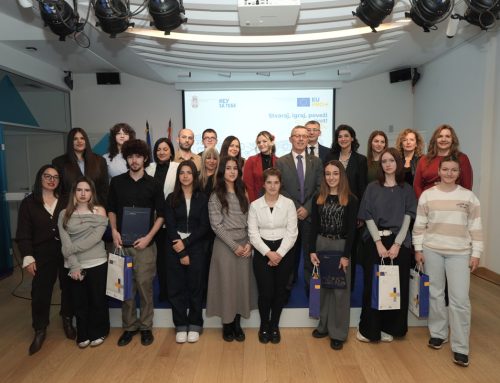“Today, since 8:00 in the morning – it means 8 hours, 8 hours of meetings – I hosted Prime Minister Albin Kurti of Kosovo and President Aleksandar Vučić of Serbia for an emergency meeting here in Brussels.
Both of them attended this meeting, coming to Brussels. And it was important that they did because we find ourselves, yet again, in another crisis situation.
And this happens only three months after the last crisis meeting – from crisis to crisis. This time, it is even worse than in August, when I had to come to Brussels in the middle of August to avoid the previous crisis. Since August, the dispute over licence plates has worsened. Kosovo had decided to start issuing fines from 22 November – it means midnight tonight – for those who have not re-registered their vehicles.
As a consequence, Kosovo Serbs have withdrawn from the institutions in north Kosovo. And it means that around 600 police officers have put down their uniforms. Judges and staff of the local administration have also resigned. Currently, less than 50 Kosovo Albanian police officers are manning the police stations in the region – which is certainly not enough.
This leaves a very dangerous security vacuum – a vacuum on the ground, in an already very fragile situation. Yes, we have a Mission there, we have the EULEX Mission and, also, the troops of KFOR are present, but they cannot take over the role of the local police: it is not in their mandate nor in their capacities.
Rule of Law must not serve as a pretext for tensions and escalation, while not respecting important and binding obligations agreed many years ago under the [Belgrade-Pristina] Dialogue being conducted by the European Union and my predecessors, High Representatives.
The European Union and our international partners have repeatedly called for de-escalation, to no avail. This meeting today was about the responsibility of leaders to urgently de-escalate the situation, to ensure that peace and stability are re-established and, most importantly, will prevail – avoiding a crisis with very grave consequences.
Since last summer, we have been preoccupied with permanent crisis management, trying to avoid one artificial deadline after another: from deadline to deadline, from crisis to crisis.
This means that we have not been able to address the real issue. The real issue is the normalisation of relations, which would resolve and prevent such crises situations – as the root causes go way beyond licence plates.
I made it very clear to both Parties that we cannot continue like this, that this vicious circle of crises and deadlines must stop.
Both President Vučić and Prime Minister Kurti are elected leaders with strong mandates. We expect them to show leadership and the will to resolve their disputes and taking the normalisation of relations forward, so that they can advance on their respective European paths.
But after many hours of discussion, since 8:00 this morning, the two Parties did not agree on a solution today.
I think that there is an important responsibility [on the side of both leaders] for the failure of the talks today and for any escalation and violence that might occur on the ground in the following days.
For the sake of transparency, I have to say that we put forward a proposal, that could have avoided this risky situation, that President Vučić accepted today but, unhappily, Prime Minister Kurti did not.
To avoid escalation, I am going to make a plea. I would have liked it to be an agreement, but since there is no agreement, let me ask solemnly to both parties:
First, I now expect Kosovo to immediately suspend further stages related to the re–registration of vehicles in north Kosovo. I repeat: I now expect Kosovo to immediately suspend further stages related to the re–registration of vehicles in north Kosovo. And Serbia, to suspend issuing new licence plates with Kosovo cities’ denominations, including KM plates.
This was the proposal that we almost reached, but since it was not possible for many different reasons [to reach an agreement], I want to stress that I am calling on both parties to implement these two requests.
This would allow space and time for the Parties to look for a sustainable solution to the licence plates issue, in the context of the normalisation of relations which is our most important objective.
In the meantime, the lack of agreement today also means that we have to draw our conclusions about how this process of negotiations is being conducted.
I will inform the Member States. I will inform my colleagues the Foreign Affairs Ministers, and our partners about the behaviour of the different Parties and the lack of respect for their international legal obligations – and, I have to say, this goes particularly for Kosovo. I know, this sends a very negative political signal.
In closing, I made it very clear to both leaders that if the European Union accession is their ultimate objective, one to which they have both committed, we expect them to act accordingly with that.
From my side, I will keep the Dialogue very high on my agenda, with the support of the European Union Special Representative [for the Belgrade-Pristina Dialogue], Miroslav Lajčák. And I want to praise him for his work, for his patience, for his strong commitment. As to the proposal that, together, we had tabled, that received strong support from France and Germany, I still think is the possible way out of this crisis, with the perspective of normalisation and full fulfilment of any engagement, commitment and agreements.
I hope that both Parties will act according to my requests in order to avoid further escalation and a new dangerous crisis.
Thank you. ”




